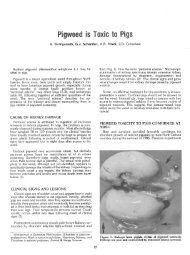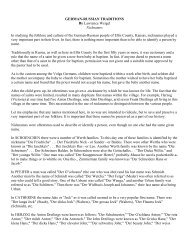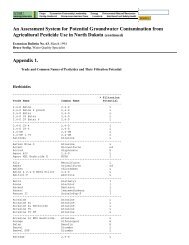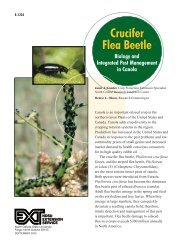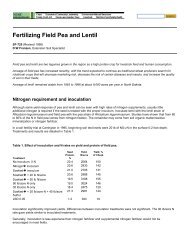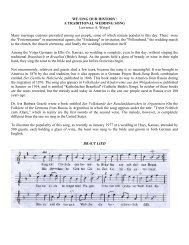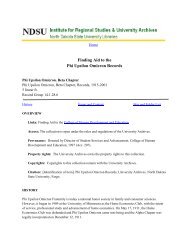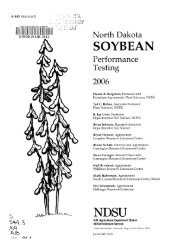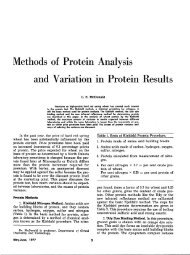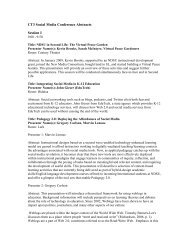germans from russia in fort collins, 1900-2000 - Libraries
germans from russia in fort collins, 1900-2000 - Libraries
germans from russia in fort collins, 1900-2000 - Libraries
You also want an ePaper? Increase the reach of your titles
YUMPU automatically turns print PDFs into web optimized ePapers that Google loves.
WORK RENDERS LIFE SWEET: GERMANS FROM RUSSIA IN FORT COLLINS<br />
pany even assisted them <strong>in</strong> construct<strong>in</strong>g a<br />
new neighborhood that is now Alta Vista.<br />
Indeed, like the Germans <strong>from</strong> Russia,<br />
Hispanics endured their own period of isolation<br />
<strong>in</strong> Fort Coll<strong>in</strong>s only to contribute their<br />
own thread to Fort Coll<strong>in</strong>s’s vibrant cultural<br />
tapestry. 97<br />
As churches ended services <strong>in</strong> German<br />
and many Germans <strong>from</strong> Russia <strong>in</strong>termarried<br />
with people of other cultures, older members<br />
of the community lamented the loss of their<br />
heritage. Anthropologist Timothy<br />
Kloberdanz, who grew up <strong>in</strong> a German-<br />
Russian household <strong>in</strong> Sterl<strong>in</strong>g, remembers his<br />
mother tell<strong>in</strong>g him that his ancestors “came<br />
<strong>from</strong> over the clouds.” It was not until he<br />
began study<strong>in</strong>g Germans <strong>from</strong> Russia as an<br />
anthropology student at the University of<br />
Colorado that he understood the myth. It was<br />
a misunderstand<strong>in</strong>g emerg<strong>in</strong>g <strong>from</strong> the cultural<br />
rift divid<strong>in</strong>g generations of Germans<br />
<strong>from</strong> Russia:<br />
As the women traced the w<strong>in</strong>d<strong>in</strong>g course<br />
of the Volga River on the map of Russia<br />
one of the most baffl<strong>in</strong>g mysteries <strong>from</strong><br />
my boyhood was solved.<br />
“Our folks didn’t come <strong>from</strong> over<br />
the clouds,” one of the surprised women<br />
whispered, “they came <strong>from</strong> over the<br />
Volga – it was a river.” The others soon<br />
realized that the phrase spoken by the<br />
older emigrants Mir se<strong>in</strong> vun iwwer d’<br />
Wolga kumme did not mean “we came<br />
<strong>from</strong> over the clouds,” but “we came<br />
<strong>from</strong> over the Volga.” To the untra<strong>in</strong>ed<br />
ears of American-born children, the<br />
dialect German word for clouds, Wolga,<br />
sounded the same as the name of<br />
Russia’s most famous river. 98<br />
But <strong>in</strong> 1968, a reawaken<strong>in</strong>g of <strong>in</strong>terest <strong>in</strong><br />
German-Russian heritage resulted <strong>in</strong> the creation<br />
of the American Historical Society of<br />
Germans <strong>from</strong> Russia (AHSGR). Based <strong>in</strong><br />
L<strong>in</strong>coln, Nebraska, the AHSGR is an <strong>in</strong>ternational,<br />
not-for-profit, educational organization<br />
that actively promotes scholarship <strong>in</strong>to<br />
the history of Germans <strong>from</strong> Russia and publishes<br />
historical and genealogical material<br />
result<strong>in</strong>g <strong>from</strong> that scholarship. In 1975, history<br />
professor Sidney Heitman established<br />
the Germans <strong>from</strong> Russia <strong>in</strong> Colorado Study<br />
Project at Colorado State University. The<br />
project supported a multidiscipl<strong>in</strong>ary study of<br />
Germans <strong>from</strong> Russia and provided much of<br />
the scholarship conta<strong>in</strong>ed <strong>in</strong> this historical<br />
context, particularly the work of Rock and<br />
Kloberdanz. The Sidney Heitman Germans<br />
<strong>from</strong> Russia Collection <strong>in</strong> the Colorado State<br />
University Archives rema<strong>in</strong>s an important<br />
resource for German-Russian scholarship. 99<br />
In 1999-<strong>2000</strong>, the Fort Coll<strong>in</strong>s Museum<br />
opened an exhibit entitled Unser Leute,<br />
which traced the history and experiences of<br />
Germans <strong>from</strong> Russia <strong>in</strong> northern Colorado.<br />
Just as German-Russian contributions to the<br />
history of Fort Coll<strong>in</strong>s rema<strong>in</strong> strong, so too<br />
does <strong>in</strong>terest and pride <strong>in</strong> German-Russian<br />
ethnicity. In a 1977 newspaper <strong>in</strong>terview,<br />
Professor Heitman emphasized the importance<br />
of Germans <strong>from</strong> Russia <strong>in</strong> Colorado,<br />
plac<strong>in</strong>g their heritage among the state’s most<br />
beloved historical legends:<br />
They played a vital role <strong>in</strong> Colorado’s<br />
agricultural development, but only lately<br />
has their story been told and their impact<br />
recognized. It’s at least as important as<br />
the cowboys, the silver k<strong>in</strong>gs and the<br />
mounta<strong>in</strong> men. 100<br />
SWCA Environmental Consultants Page 28



